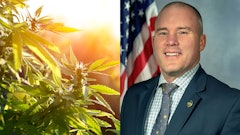
Massachusetts marijuana regulators should lay out specific energy efficiency and environmental standards as a condition of a marijuana license, Gov. Charlie Baker's energy secretariat said Friday.
In a letter to the Cannabis Control Commission, Tori Kim, a top lawyer for Baker's energy and environmental affairs department, said the commission's proposed regulations don't go far enough.
"Experience from other states has shown that the energy usage of marijuana establishments, especially large-scale, indoor facilities engaged in cultivation, is extraordinarily high," she wrote.
That means the new industry could come with a big carbon footprint, and "corresponding negative effects" on the state's goals to fight global warming, her letter said.
Top photo courtesy of Adobe Stock

























